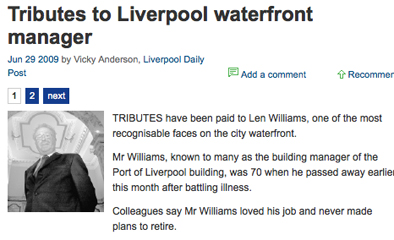This is an edited cross-post from Malcolm Coles’ personal website:
The Daily Mail surprisingly overtook the Telegraph and Guardian in the June ABCes – with more unique visitors than any other UK newspaper.
However it was only 4th in terms of UK visitors. Figures from Compete.com, which tracks Americans’ internet use, suggest that, of the 4.7 million unique users the Mail added from May to June, 1.2 million were from the USA. American and other foreign visitors searching for Michael Jackson’s kids – the Mail tops google.com for a search on this – drove this overseas growth.
US traffic to UK newspaper sites
This is what happened to US traffic for the ‘big three’ UK newspaper websites from May to June, according to Compete.com’s figures:
This dramatic increase in traffic, compared to its rivals, from May to June helps explains how the Mail leapfrogged the Guardian and Telegraph.
Google.com was the main referrer to the Mail – responsible for 22.7 per cent of its traffic. More on this below. Next up was drudgereport.com [a large US news aggregation site], followed by Yahoo.com and Facebook.com.
What was behind this rise in US traffic?
So what led to this sudden increase for the Mail? Compete also shows you the main search terms that lead US visitors to sites.
Top five search terms that lead US visitors to the Guardian
- Guardian/the guardian: 2.6 per cent
- Michael Jackson: 0.9 per cent
- Swine flu symptoms: 0.6 per cent
- Susan Boyle: 0.6 per cent
Top five search terms that lead US visitors to the Telegraph
- Michael Jackson: 2.5 per cent
- Susan Boyle: 0.8 per cent
- Swine flu symptoms: 0.7 per cent
- Daily Telegraph: 0.6 per cent
- Michael Jackson children: 0.5 per cent
Top five search terms that lead US visitors to the Daily Mail
- Daily Mail/Dailymail: 9.9 per cent
- Michael Jackson (or Jackson’s) children: 2.9 per cent
- Michael Jackson’s kids: 1.3 per cent
What does this tell us?
The Guardian’s top five search terms, as suggested by Compete.com, accounted for just 4.7 per cent of its search traffic. The Telegraph’s top five for 5.1 per cent.
But the Mail’s top 5 accounted for a massive 14.1 per cent – split between searches for its brand name and for Michael Jackson’s kids (and outside the top five there may have been many other MJ-related terms).
Its search traffic in June is heavily skewed to these two search terms in the USA – and elsewhere in the world, I think it’s reasonable to presume.
Can this last?
Searches in the USA for ‘Daily Mail’ have been fairly consistent over the last few months according to Google Insights. I don’t know why so many people do this compared to other newspapers.
But I do know that interest in Michael Jackson’s kids is going to die down. This graph shows how there was a huge and sudden surge in searches for his children and kids after he died. The graph shows just two search terms – there are likely to be many others, and so a significant proportion of the Mail’s overseas traffic increase is down to search terms related to Jackson’s offspring.
This increase in searches translates into traffic for the Mail because it is currently TOP for a search on ‘Michael Jackson children’ at google.com and 3rd for kids (it’s also top in Google India for a search on his children, and India is the next most common source of traffic to the Mail after the UK and USA).
So all this data suggests that the Mail’s top spot in June’s ABCes is built on US and other worldwide search traffic around Jackson’s children – the massive peak in late June and again around his funeral in early July.
Once people stop searching for these terms, this traffic will disappear. The Mail may still top July’s ABCes on the back of this traffic – but it’s hard to believe it will still be top in August.
Methodology
You can, of course, pick holes in this argument.
The three MJ’s kids search terms account for 4.2 per cent of Google traffic, which accounts for 22.7 per cent of 5.2 million visitors – so about 50,000 users.
But I think it’s reasonable to assume that there are more search terms outside the top five; there are other search engines; and that the other sources of traffic, such as people sharing links on Facebook and news aggregators, will also partially be about Jackson’s children.
Plus this is the only publicly available data that I’m aware of, and this is the story it seems to be telling.




